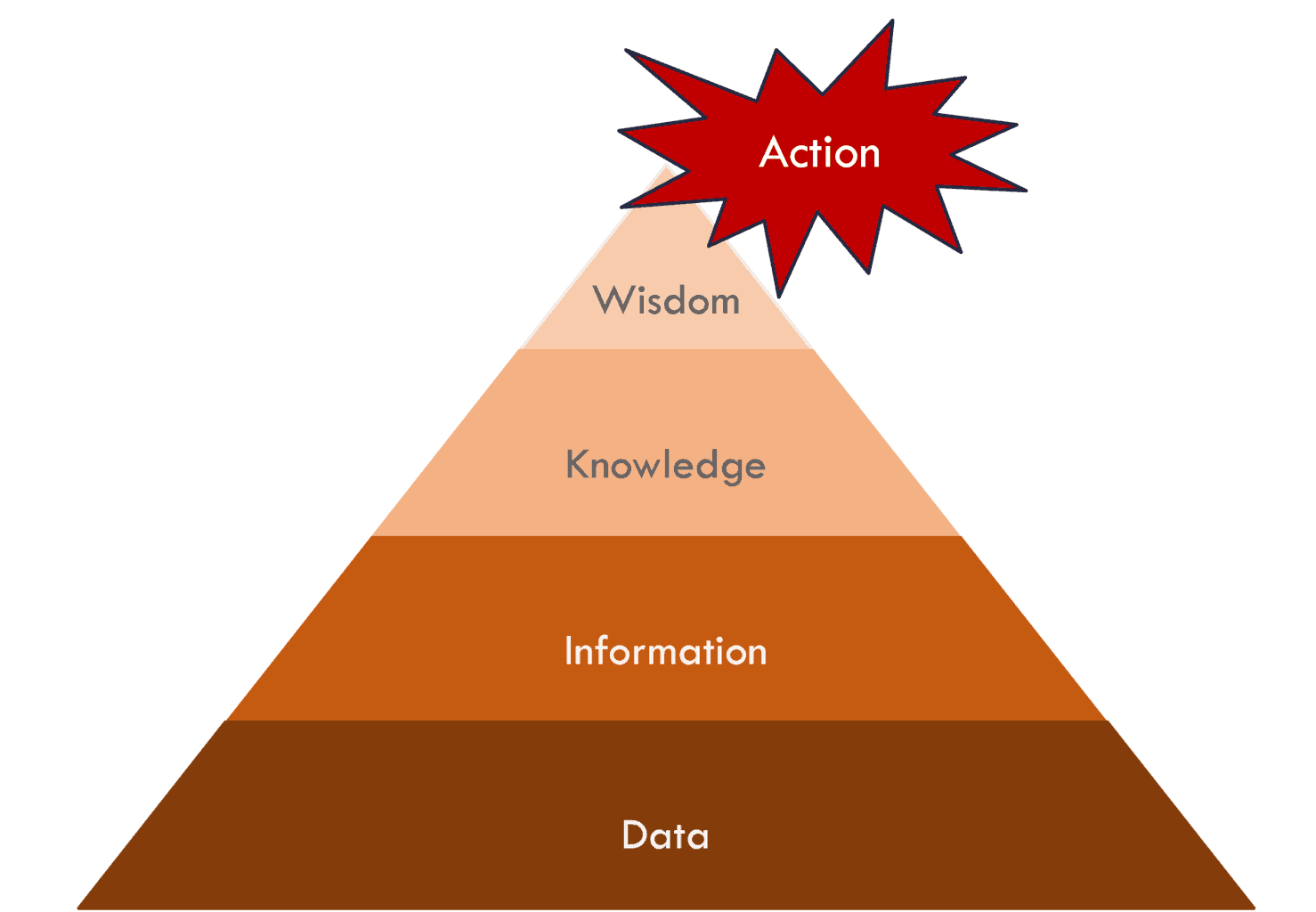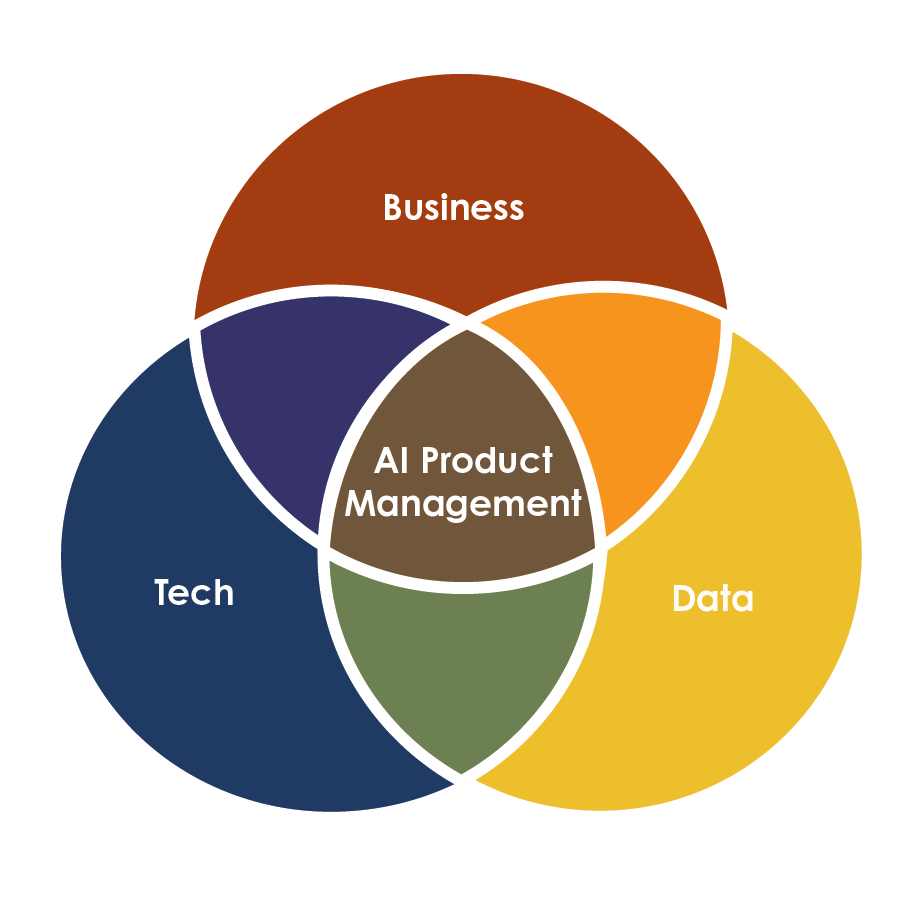In today’s data-driven world, an Analytics Product Manager plays a pivotal role in bridging the gap between data and business outcomes. This role drives the transformation of raw data into actionable insights that empower organizations to make informed decisions, optimize strategies, and achieve their goals. To better understand this dynamic role, we’ll explore:
- What is analytics?
- What is an analytics product manager?
- How to become an analytics product manager

What is Analytics?
Analytics is the systematic function of examining, processing, and interpreting data to uncover insights, patterns, and trends that inform better decision-making.
Traditionally, analytics teams might not have an analytics product manager. But this role is often the differentiator between mediocre and successful analytics products.
To better understand this, we’ll explore the popular Data Information Knowledge Wisdom (DIKW) Pyramid and how effective analytics product managers drive action in each layer of the pyramid.
The DIKW Pyramid
The DIKW Pyramid (pictured below) is a common framework that explains the different levels of analytics sophistication. Each layer builds on top of the layer below it.

- Data: These are raw and unprocessed sets of observations, typically stored in a database or table. Like raw oil, unprocessed data itself is not useful. Examples include raw data files or transactional records. This is the layer where data engineers focus their efforts.
- Information: Data becomes Information when it is transformed for human consumption. It answers the “who, what, where, and when” questions within data. Examples include monthly sales reports, basic visualizations, or organized spreadsheets. Analysts of all types (such as data, financial, operational, and business intelligence analysts) lead efforts in this layer.
- Knowledge: Information becomes Knowledge when it is analyzed, interpreted, and contextualized. This layer answers the “how and why” aspect of data, often provides future-facing insights, and uncovers underlying patterns. Examples include revenue forecasts, research papers, fraud predictions, and correlation analyses. Data scientists are among the key professionals who focus on producing Knowledge.
- Wisdom: The pinnacle of the pyramid, Wisdom represents the ability to make sound judgments and decisions based on Knowledge. Examples include executive-level strategies and chatbots that understand consumer questions. Data scientists and executive leadership tend to drive this layer.
The Action Gap
Although a popular framework, the DIKW Pyramid by itself does not represent value. Indeed many analytics teams can successfully climb to the top of the pyramid but fail to influence decisions or change customer behavior. Often this is because the analytics teams don’t understand which data initiatives best align with organizational or consumer value.
The Analytics Product Manager Role
Driving Action in each DIKW Layer
To gain value out of each DIKW layer, effective analytics product managers step in to steer analytics initiatives. They continually drive action by converting the work of each layer into value.
- Data: In the data layer, product managers collaborate with a wide range of professionals such as data scientists, business analysts, and information technology professionals to identify the relevant data that can help drive strategic value. They define how to get the data (purchase, use existing, or start collecting new data), and work with teams such data engineering, a purchasing department, or a project manager to make this data available to the right users in the appropriate format. Product managers who specialize in this layer are often known as Data Product Managers. Sometimes the product is the data itself which can be sold to third parties (a data product).
- Information: Often, analytics product managers don’t just stop at the data layer but rather guide its transformation into higher-level analytics products. Product Managers might work with analysts to conduct customer research and exploratory data analyses to gain a deep understanding of stakeholder needs. Then, they define analytics products such as business intelligence dashboards, querying systems, and business reports. Effective product managers help stakeholders understand how to use these analytics artifacts so that they can react accordingly.
- Knowledge: Going further, some analytics product managers carry this Information up to the Knowledge phase. Here, they define clear problems and opportunities that can be solved using advanced analytic techniques. Often they work with data scientists to build machine learning products that predict outcomes such as customer churn, fraud detection, or sales forecasts. Product managers who focus on this layer often serve the role of a Data Science Product Manager within a data science team.
- Wisdom: The most complicated but often most valuable layer is Wisdom. Here, analytics product managers use Knowledge to influence behaviors that can improve outcomes. For example, they take the Knowledge of who is likely to churn and then work with a customer experience team to improve customer retention. Alternatively, they might take sales forecasts to work with a supply chain team to order sufficient (but not excessive) levels of inventories to meet demand. Product Managers who can drive products into this phase stand out among their peers and are often known as AI Product Managers.
10 Analytic Product Manager Role and Responsibilities
Although their responsibilities vary by company and DIKW-focus area, analytics product managers commonly are responsible for:
- Product Vision and Strategy: They define the vision and strategy for data and analytics products based on the business’s objectives and the evolving needs of users.
- Product Roadmap: They communicate expectations to stakeholders by defining the various high-level features across time by defining and maintaining a roadmap.
- Market Research: External-facing product managers will research market trends and customer feedback to identify opportunities to improve their analytic products. If they are responsible for marketing the analytics products, they might hold the title of Product Marketing Manager.
- Cross-Functional Collaboration: Communication is key for analytics product managers because they work across several different functions. They often need to wrangle the efforts of data engineers, data scientists, business analysts, executives, customers, product, and legal/compliance so that their product can come to life.
- Prioritization: There is always more that could be done than organizational teams have time to deliver. Thus, product managers must prioritize features that deliver the highest value relative to delivery effort and risk.
- Serve as Product Owner: Scrum and Data Driven Scrum teams have a Product Owner role that defines, prioritizes, and approves deliverables in defined Sprint or Iteration cycles. Often, Product Managers serve as Product Owners (although some organizations keep these roles separate).
- Voice of the Customers: Nearly all product managers serve as a proxy voice representing the collective needs of their stakeholders in all relevant meetings and prioritization decisions.
- Testing and Validation: “Garbage in, garbage out” is a common phrase that highlights the need for quality data and analytics products. Product Managers work closely with developers, analysts, and testers to ensure quality across each level of the DIKW Pyramid.
- Measurement: Product Managers are often held accountable to ensure their products achieve certain outcomes. The specific metrics vary widely but here is a list of common types of data science metrics.
- Manage the Product Life Cycle: Each product has its own defined life cycle which flows through various stages of maturity. The Product Manager delivers each product phase, often by guiding the work of data engineers, analysts, and scientists.

AI Product Life Cycle
How to become an Analytics Product Manager
Develop these 5 in-demand Skills
Because the role is very dynamic and covers multiple domains, an analytics product manager needs to develop a wide set of skills. To unlock your entry or advancement into analytics product management roles, work on side- or real-world projects that improve your skills in these areas.
- Data Literacy: All analytics professionals should be comfortable working with data, understanding its structures, and being able to ask the right questions. Proficiency in data tools, languages like SQL, data visualization tools, and an understanding of databases is essential.
- Business Acumen: Analytics product Managers must bridge the gap between data and business goals. This requires a strong understanding of the organization’s strategies, objectives, and market dynamics. They should be able to translate technical insights into business impact, aligning product development with the company’s overarching vision.
- Communication Skills: Analytics product Managers need to convey complex technical concepts to non-technical stakeholders and facilitate collaboration among cross-functional teams. Focus on project management and presentation skills so that you improve your ability to persuasively communicate across diverse stakeholders.
- Agile Competencies: Understanding Agile product management concepts can help you guide the development process. You should be able to manage processes as defined in frameworks such as Scrum, Data Driven Scrum, or Kanban. Moreover, learn to manage key backlog constructs such as User Stories and Minimal Viable Products.
- User Centric Designs: To create products that resonate with users, analytics product managers should understand the user-centric mindset. Specifically, you need to be in touch with user needs and preferences, gather user feedback, and make data-driven product decisions that improve the user experience.
Earn an Analytics Product Manager Certification
Earning relevant certifications can help you learn key skills and demonstrate your qualifications to potential employers. Some key certifications include:
- Many employers look for applicants to hold a Scrum certification. Earning one of these three primary certifications demonstrates your understanding of the product owner role. Three recognized certifications are the Certified Scrum Product Owner through the Scrum Alliance, the Professional Scrum Product Owner through scrum.org, and the Registered Product Owner through Scrum, Inc.
- The Pragmatic Institute offers the Pragmatic Certified Product Manager course which covers fundamental concepts that product managers should understand. It includes Agile practices but is more generalized than the previously listed Scrum certifications and focuses more on conceptual frameworks than the execution of a product owner role.
Manage your Career as a Product
Regardless of the career path you take, recognize that your career services are a product. As such, be the product manager of your own career. To help you along the way:
- Remember your purpose. Why do you want to be an analytics product manager? What are you passionate about? Define your own Why, just like you would define the vision of any product you manage.
- Celebrate your successes. Just as a product team should celebrate product launches, you should also take the time to celebrate your successes, no matter how big or small. This will help you stay positive and motivated.
- Don’t be afraid to fail. Just like failure is inevitable in product endeavors, you will also make mistakes on your career journey. Use these experiences to reflect and learn.
- Manage your career roadmap. Define and manage a roadmap for your career. Start with where you aspire to be in 10+ years and work backward to focus on the milestones (certifications, skillsets, etc) that map to your vision.
- Have fun! Analytics product management can be a challenging but rewarding career. Enjoy the journey!




